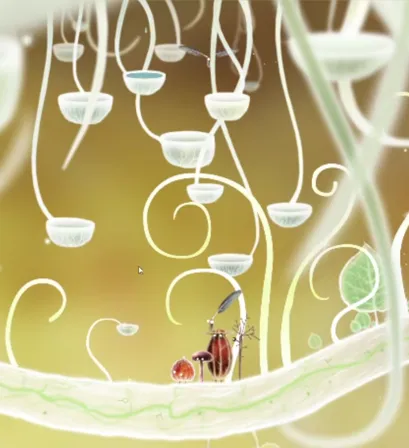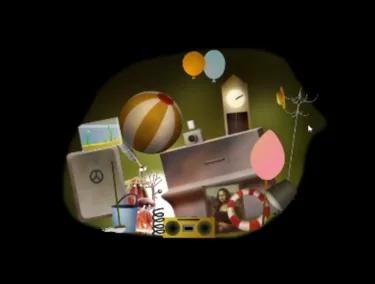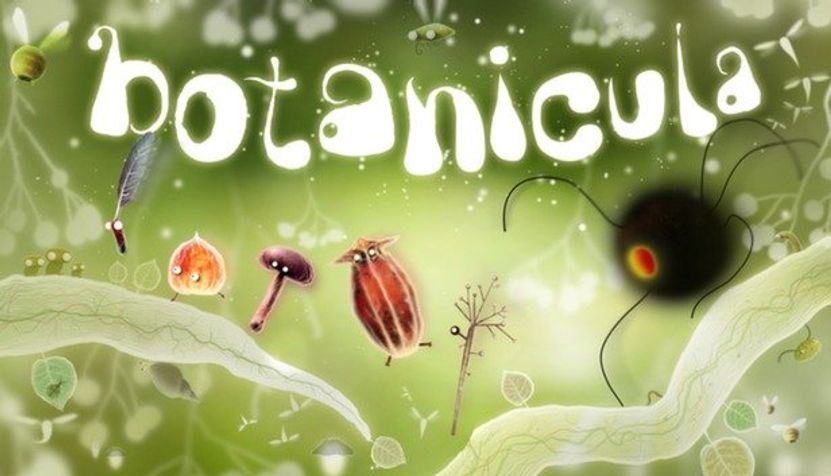Botanicula
It’s interesting running into a genre whose heyday has long past. Point and click adventures were massive in the 90s, and many of the finest games of the 90s were point and click. The genre has since dropped off dramatically, though the why of that is something I’ll explore in more detail further in the review. It’s relevant, you see, because Botanicula is a point and click adventure.
 Here you see the “point” part of a point and click
Here you see the “point” part of a point and click
Botanicula is a point and click adventure. You play as a group of forest friends who are on a quest to stop the evil black spider thing from destroying their home. They journey through their forest home, encountering a myriad of creatures, solving problems, and bringing light to the world on their way.
It is an abundantly cute game. The soundtrack is a wonderful blend of vocals and upbeat instrumentals, and the five main characters are wholesome in their desire to stand up for and help each other. The puzzles centre around helping improve the world around them, and in many ways, it’s a happy cathartic little game, full of solving the world’s woes and leaving everything and everyone in a better place. I haven’t played something this sweet in a long time, and in many ways, it was exactly what I was looking for.
 I must rescue the baby!
I must rescue the baby!
This did lead me to the thought of why I hadn’t played something like it yet in this series. Certainly point and clicks aren’t a new genre for me. I, like many people my age, grew up on games like it (Connections was a big favourite in my house), and I have a lot of fond memories of them. The closest this series has come to them, though, is Arkham Horror: Mother’s Embrace , and there, it was blended with party strategy, rather than being purely puzzle solving and clicking. For something so beloved, especially in a decade where our previous loves are being so thoroughly mined for nostalgia, why do we see so few point and clicks?
I have a few theories, and they spell out both what does and does not work about Botanicula. They can be summed up in a screenshot.
 This screenshot, to be specific.
This screenshot, to be specific.
For context, the above screenshot is a scene with a puzzle. The characters are looking for fourteen sacred birds, one of which is in this image. There are also objects that do things, and there are objects that are needed for other puzzles, but the only way to find them all is to click. This is the heart of the genre, and I think why the genre fell out of fashion.
Point and clicks work great to tell a story and immerse someone in a story. They’re easy to make, and in eras when disc space was limited, they worked well as a way to tell a grand story and direct the player. However, the reality is that that desire to tell a story has found new and better homes in walking simulators like 35MM , where a story can be coupled with clear guidance of where to go and how to get there. Point and clicks, by design, have red herring clickables, and puzzles that necessitate more clicking. Clicking begets clicking to solve puzzles that make no real sense. In the above picture, I need to click the right thing so I can get the coin so I can flood the room so I can get the sacred bird. It’s a long chain that isn’t necessarily intuitive, and which, if I stop to think about it too long, starts to feel ridiculous.
The first time I went to solve this puzzle, I missed the thing I had to click. To find it, I had to pan the mouse over, waiting for the cursor to change. It’s a design choice that necessitates a careful examination of the details, and making sure nothing is missed, but also one that leads to frustration if the answer doesn’t become clear. Point and clicks need the environment and the atmosphere to do a lot of lifting to keep the player engaged as they click through red herrings.
Botanicula succeeds fairly well here. As mentioned earlier, its design and atmosphere are phenomenal, and it did keep me engaged. Its puzzles also aren’t so arcane that they’re impossible to navigate. They’re logical, and the player often comes to their solutions naturally. It’s sweet, and it perfectly navigates the pitfalls of its genre through heavy investment in its oeuvre. It’s a good modern take on an old genre, showing exactly how it can be brought into the 2010s.
Developer: Amanita Design
Genre: Adventure, Point-And-Click
Year: 2012
Country: Czechia
Language: English
Play Time: 3 - 4 Hours
